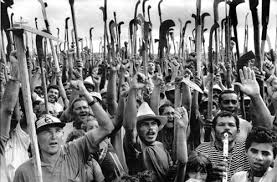The Prison of Darkness
One of the notable features of the widespread mainstream attention to the U.S. use of torture in the past few years is the impression conveyed that U.S. practices don't amount real torture but just a little rough treatment that's not quite by the books. When the word "torture" is used by the media, it's often accompanied by debate about whether the term is appropriate. Electrical shocks applied to detainees are "simulated" when the U.S. government does it. We're gentle as kittens next to the real bad guys out there.
And indeed, there's no evidence U.S. officials have been pulling fingernails off or bodies apart - we send detainees to other countries to do the dirtiest work. Reading the document released by Human Rights Watch yesterday on the latest reports of U.S. torture, I shudder to think of what horrors could be too awful for the CIA to do itself.
["U.S. Operated Secret ‘Dark Prison’ in Kabul," December 19, 2005]
Excerpts:
Accounts from detainees at Guantánamo reveal that the United States as recently as last year operated a secret prison in Afghanistan where detainees were subjected to torture and other mistreatment, Human Rights Watch said today.
Eight detainees now held at Guantánamo described to their attorneys how they were held at a facility near Kabul at various times between 2002 and 2004. The detainees, who called the facility the “dark prison” or “prison of darkness,” said they were chained to walls, deprived of food and drinking water, and kept in total darkness with loud rap, heavy metal music, or other sounds blared for weeks at a time.
***
The detainees said U.S. interrogators slapped or punched them during interrogations. They described being held in complete darkness for weeks on end, shackled to rings bolted into the walls of their cells, with loud music or other sounds played continuously. Some detainees said they were shackled in a manner that made it impossible to lie down or sleep, with restraints that caused their hands and wrists to swell up or bruise. The detainees said they were deprived of food for days at a time, and given only filthy water to drink.
***
M.Z., a detainee arrested in another country in 2002 (name and identifying details withheld at his attorney’s request), said he was held at the “prison of darkness” for about four weeks. He says he was sent to “an underground place, very dark” where there was “loud music” playing continuously. He said he was held in solitary confinement, where it was “pitch black... no light.” M.Z. said that when he was interrogated he was taken to a room with a strobe light, and shackled to a ring on the floor. During the interrogations, he says, an interrogator threatened him with rape.
***
It was pitch black no lights on in the rooms for most of the time.... They hung me up. I was allowed a few hours of sleep on the second day, then hung up again, this time for two days. My legs had swollen. My wrists and hands had gone numb.... There was loud music, [Eminem’s] “Slim Shady” and Dr. Dre for 20 days.... [Then] they changed the sounds to horrible ghost laughter and Halloween sounds. [At one point, I was] chained to the rails for a fortnight.... The CIA worked on people, including me, day and night.... Plenty lost their minds. I could hear people knocking their heads against the walls and the doors, screaming their heads off.
J.K., another detainee (name withheld at attorney’s request), also alleged that he had been held in the dark, shackled to the wall and subjected to weeks of sleep deprivation and constant loud music and noise, as well as being beaten during interrogations. “People were screaming in pain and crying all the time,” he told his attorney.
***
On November 18, ABC News reported that several CIA officials told ABC that the CIA had operated a secret facility in Kabul, and voiced concerns about interrogations there. The CIA officials, who requested anonymity from ABC, said that CIA officials authorized six techniques for use against detainees with “high-level” intelligence value, including long-term sleep deprivation, exposure to cold for more than 40 hours, and “waterboarding,” in which interrogators poured water over the detainee’s face until he believed he would suffocate or drown.
***
Human Rights Watch said that the alleged torture and other mistreatment of detainees, if proven, would amount to serious violations of U.S. criminal law, such as the War Crimes Act and the Anti-Torture Statute, as well as the laws of Afghanistan. The mistreatment of detainees also violates the Convention against Torture and the International Covenant on Civil and Political Rights, both of which the United States has ratified, and the laws of war.



0 Comments:
Post a Comment
<< Home